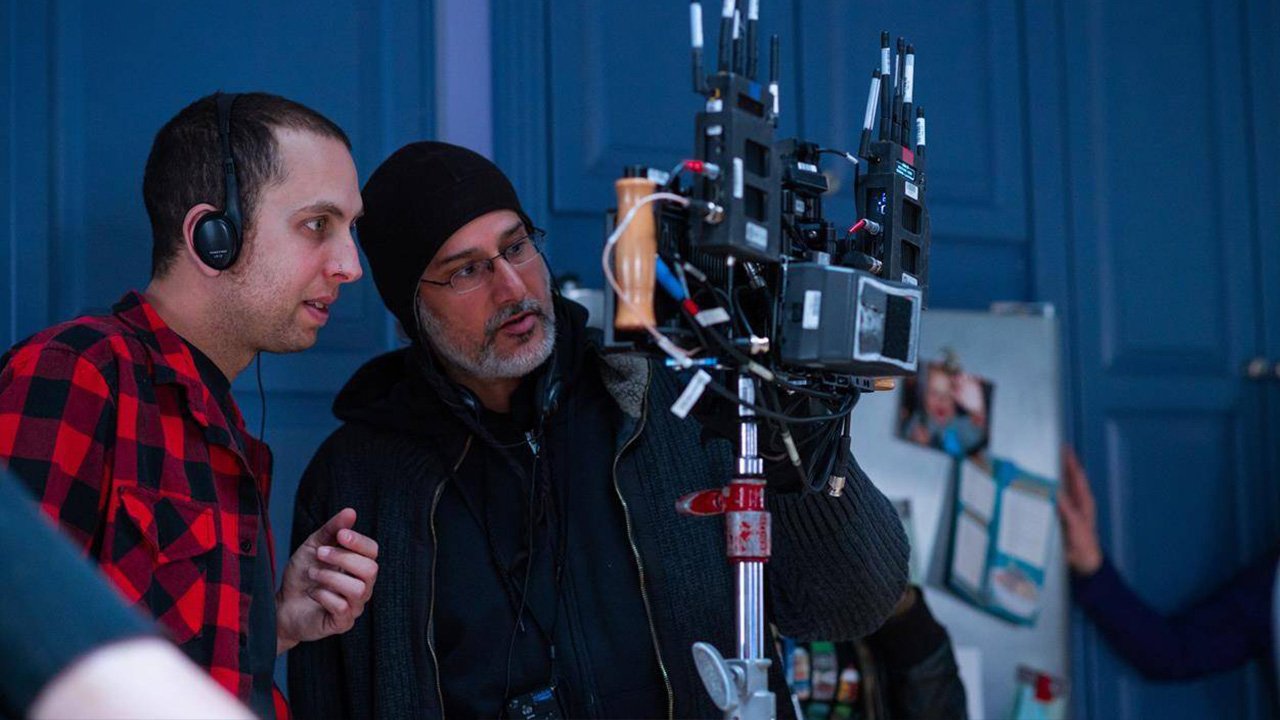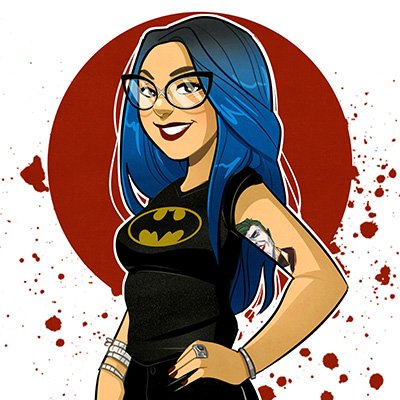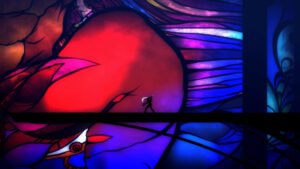Brandon Cronenberg rapidly became known for his stylistic dreamlike films that dance with the goriest explorations of philosophical concepts.
In his latest, Possessor, Cronenberg weaves a yarn about Tasya Vos (Andrea Riseborough), a contract killer who does her dirty deeds by transplanting her consciousness into patsies. Her handler, Girder (Jennifer Jason Leigh), sends her into her most high stakes job yet, taking over the body of Colin Tate (Christopher Abbott) in order to execute a wealthy CEO and his would be heirs. The stunning movie leans into the philosophical implications of theories of the self, and uses them to further explore the simpler ideas of sense of self, something that pits personal and work life against each other.
To further dig into the themes of the film, Cronenberg joined us for a roundtable discussion about his influences, his personal theories of the self, his upcoming projects, and, of course, the blood.
Talking about identity, do you feel like it’s more solely in the mind, or do you think it is connected to our physical body?
I don’t really think there’s a difference between mind and body. I think it’s all the same. I think the mind is really a process of the brain and you can’t really disconnect the two, even though in the film, it plays it a little bit like that through the science fiction because she’s inhabiting other people’s bodies remotely, that’s more of a metaphorical thing to discuss identity, but in reality, I don’t think those need to be really separated.
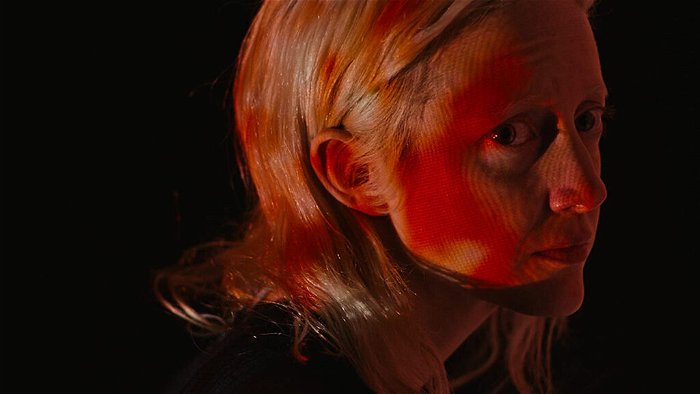
Antiviral was a spectacular debut and Possessor has just surpassed that and it’s an amazing film. Are there aspects of the two films which overlap? Or were you looking to go in a completely different direction?
I wasn’t intending for them to overlap. I’ve had some people suggested there are some preoccupations across the two of them; construction of identity or injecting identity, in a sense, into someone else’s body. But I honestly wasn’t thinking of Antiviral when I was writing Possessor. It’s its own separate film.
Talk to me a bit about the conception of the explanation piece. So the part where the handler (Girder) is explaining how the job’s going to go, how the implants are going to dissolve. I’d just really love to hear about all the considerations you made as you created that.
A lot of it was, I guess, necessary exposition to set up the premise. I was, to a certain degree, trying to think through the reality of the tech and how that could function. Not to go into too much detail about it, of course, because in some ways, it’s fantasy technology and intended to operate metaphorically, but it has to feel plausible for the film world, and there has to be a certain amount of logic set up, at least initially.
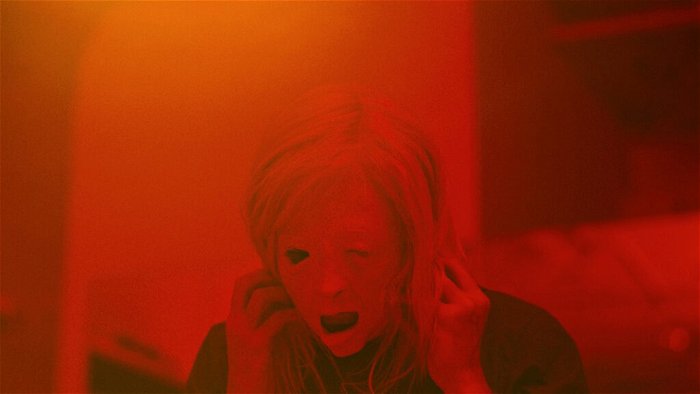
What can you tell us about the brutality of the violence in the film and how it relates to the state of mind of some of the characters? At one point, Girder actually asked her (Vos) why she resorted to stabbing and not shooting.
Her relationship with violence is very much at the heart of her character. So the violence in the film is really very much narrative. I felt it had to be visceral. People had to feel on an almost bodily level, what she was experiencing emotionally, and it also tracks with her psychology. So sometimes, we’re seeing it from a more observational perspective, then looking back on it, it’s more sort of stylized, almost fetishistic for her. I don’t want to go too far into analyzing the character, because I had very specific ideas about how their arcs would play out, and the narrative arc is designed to leave a little space for various interpretations from the audience. I don’t want to preclude the possibility of having audience members explore it for themselves. Certainly, I was thinking of her, in some sense, like one of those drone pilots who experiences PTSD because of the violence that they’re engaged in, even though they’re engaged in it remotely. And yet, at the same time, there’s something in her character that’s very much drawn to it. I think it’s a bit of a question whether that’s something inherent to her, or whether that’s something that’s being planted in her character by her mentor to be run by the Corporation.
One of the things I thought was so interesting, especially at the end of the film, is the conversation between Colin and Tasya and this battle between who is culpable in that case as things start to spiral out. Can you speak a little bit to where you think that line may be? We talked about identity before, with who we are and the effects of what has been done in our past, because here, you have a character that’s saying, “I’m not guilty and you were there.” I was just wondering what that line means to you.
I’d like to say two things about that. First of all, one of the things that I keep coming back to when I’m writing Possessor, and other things I’ve been working on, is the process by which we construct a sense of unified self, despite the fact that doesn’t really exist. I think a human being is a chorus of conflicting impulses, and ideas and emotions. Some of those come from our own brain, some of them don’t. There’s this very interesting science, examining, for instance, human microbiome, and how other micro organisms in our digestive tracts or parasites can affect our personality and affect our behaviors. And of course, in a more figurative sense, there’s the question of what you could call psychological infections, how we can pick up ideas from other people and claim them for ourselves. That’s especially interesting, and kind of terrifying right now, when you look at what’s happening on social media, for instance, foreign states meddling in the US elections. We are, in a sense, hackable right no because we’re so completely online. I don’t think we really yet understand what human society is becoming because of that, but certainly a lot people believe that they have certain ideas that they’ve generated themselves but they’re actually being manipulated in fairly nuanced ways online.
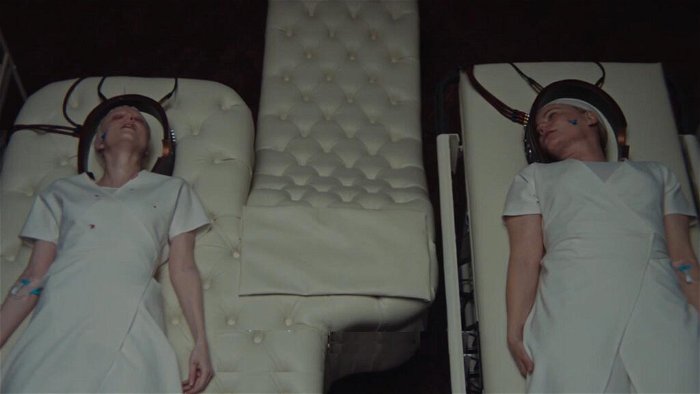
I did some research into the neuroscience behind brain control. One of the things that I found was a Spanish doctor named Jose Delgado had done some experiments in the United States, involving brain implants in animals and also in human beings. There’s a scene in the film, where there’s a kind of documentary playing on the television where there’s this bull fight and the bull is implanted with this receiver and then the bull ring, that’s actually footage from one of his experiments.
A particularly interesting one that he described in a book that he wrote was an experiment where, because of the spot in the brain that he put this wire that was simulating different areas of the brain electrically, because of where that wire was, the subject was acting in response to stimulation, but then claiming those actions for himself. So, for instance, the experimenter would press a button, every time he pressed the button, the subject would get up from his chair, walk in a circle, and then sit back down again. But every time he did that, he would insist that he had done that of his own free will, that he was just looking for shoes, or that he had heard a noise somewhere, and was going to investigate. I think there’s a very interesting process of the brain by which we, in a sense, determine after the fact whether an idea or an action was generated internally, which I think has fascinating scientific and philosophical implications.
I think all of us at some point deal with having some imposter syndrome, especially when something monumental is happening to us. I guess we want to pinch ourselves and questions whether we’re just pretending this whole time? Is that something Possessor was meant to tap into?
I would say it goes even deeper than that. Ultimately, I don’t really think we have a true self. Beneath everything, I think it’s all, to a certain degree, performance. Sometimes we’re performing for other people, sometimes we’re performing for ourselves. Definitely, there is an interesting common experience of being in a particular situation, or trying to accomplish something, and not being able to see yourself in it somehow, because it’s at odds with your identity, whether it’s imposter syndrome in the sense that you mean it or whether it’s just that disconnect between our own self image and how other people see us.
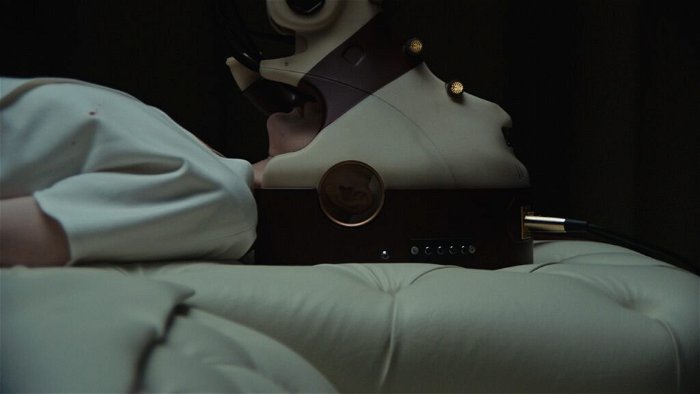
You’ve touched on this a bit, just now and when you were talking about the comparison to a drone pilot, but I know some people read this film as a statement on the woman balancing career and family life and struggling with it. Some others thought it was more of a general statement on careers permeating our personal lives and the duality of us that way. Can you speak to those themes and what was intentional or how it turned out?
To me, the career aspect of it is maybe a part of a broader struggle that we have, again, with how internally we see ourselves, but also, on a certain level, we’re all apes living animal lives, but in the strange human civilization that we built for ourselves. I think who we are internally is very chaotic and animal. Then who we are, as a result of civilized societies is somehow very restrained. I feel like there’s often a disconnect between what’s expected of us, and all the inner turmoil within us. That’s certainly true in a professional sense. The intention was both a bit more broad and a bit more specific. Broad in that I meant to comment on how all of us are dealing with that. Specific, in Vos’ case, it’s a very pronounced disconnect, because she has this sense of violence in her and these impulses, which are so at odds with what’s expected of her in a civilized domestic setting. In many ways, that is more horrific than the violence.
One of the more memorable sequences in the film was the host analysis, which swapped back and forth between reality and subconscious and the subconscious in the world. What were some of your visual influences?
To be honest, I can’t remember. I tend to watch a lot of movies with my close collaborators, like Karim Hussain, my cinematographer and Rob Cotterill, assistant director and producer. They all kind of mash together in my mind, in a kind of loaf that I store somewhere in the back of my mind, and in the development of it, it becomes hard to untangle the influences. But I mean we watched a lot of Argento, his Opera, we looked at Inferno for camera trickery, and then we just spent a lot of time experimenting and finding things that felt good to have.
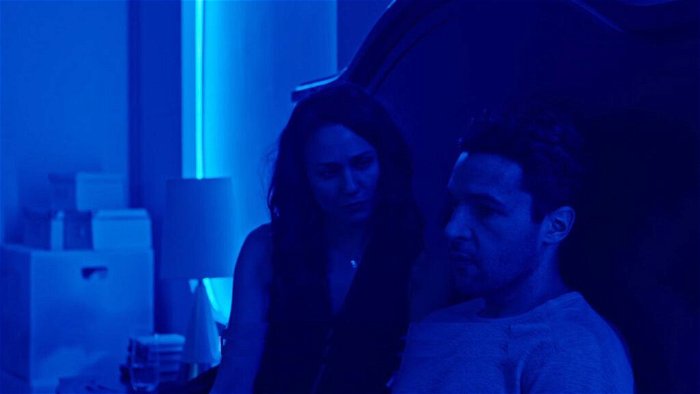
At the end of your career, what you would like to be known for as a filmmaker?
I try not to think about that, because it’s just not something you’ve ever really have control over. On a film by film basis, I’ve tried to make movies that are somehow satisfying to me and they’re a lot of expressions of my own creative impulses and interests. I think that’s sort of all you can really do. I don’t think it’s necessarily healthy to think about the end of your career, maybe at all. But, also, it’s so out of your hands how people are going to see your film. And of course, that’s something that always evolves. You have filmmakers, who, long after they’re dead either go in or out of style, depending on previous discoveries, and what ideas people have about their work. So once the film is done, it really becomes something for other people to either take value from or not.
You said before that Possessor was one much denser script, which you broke into two screenplays. Will we be seeing that other film in the future?
It’s quite possible. The other screenplay’s still in the early malformed phase of writing it, it’s not really shootable in its current form, but it has some stuff in it that I am very interested in. I ended up writing two films over the course of Possessor development because it took a very long time to get it together. Those will presumably be my next projects, they’re both fairly far in the development process. One is called Infinity Pool, which is kind of a touristy resort satire with sci-fi horror elements. The other is a hallucinatory based horror film called Dragon. I would love to shoot those back to back as soon as I’m allowed to. But definitely the other script is something I’ll probably return to when I have some time.
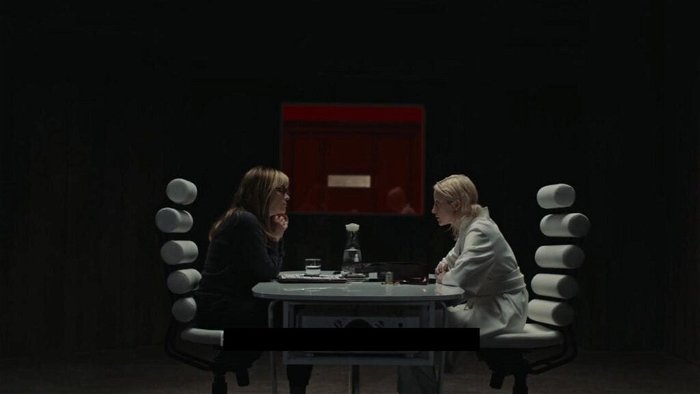
Tell me everything about the blood in the film, what you used, how much you wanted, how you lit it, everything.
The blood was spectacular and I can’t tell you too much about it because it was actually a secret recipe and I don’t know what it was. We had this fantastic effects artist, Dan Martin, on the film, and he’s responsible for so much of the wonderful practical trickery. He had some contact who had this incredible formula for this very advanced kind of fake blood which looks amazing. It actually coagulates like real blood and then washes off anything incredibly easily so it’s great for resetting. But I don’t know what’s in it. I don’t even know if he knows what’s in it because it’s someone’s secret formula
Tantalizing.
How do you feel you evolved as a filmmaker the eight years between Antiviral and Possessor?
It’s a hard question to answer because I don’t really have that kind of perspective on myself. I like to think that I have maybe, a bit of a bit bigger filmmaking toolbox. Obviously, the more you do it, the more you evolve, and you end up pursuing certain paths in directing, but I don’t really have an answer for you because I think that’s a question for other people looking in at the work from the outside.
Possessor is available on VOD October 2, 2020
